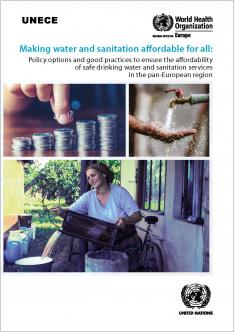The Protocol on Water and Health specifies that in pursuing the aims of providing access to drinking water and the provision of sanitation for all, special consideration should be paid to ensure equitable access to these services for all members of the population.
This policy brief aims to support the efforts of countries in the pan-European region in the progressive realization of the human rights to safe drinking water and sanitation. Specifically, it intends to raise the profile of affordability issues among policymakers, enhance the understanding of how affordability concerns can be addressed, and inspire and promote further action on ensuring affordable water and sanitation services.
The policy brief reflects on why affordability matters, how affordability can be defined, what policy and social protection options and measures are available to ensure affordability. It also describes the good practices in implementing them and explains how affordability measures can be financed, as well as the current needs and way forward at the regional level.
Since 2011, several guidance documents and tools have been developed under the Protocol to help countries better understand, assess and address the challenges of ensuring equitable access to water and sanitation. Consequently, several countries in the pan-European region have taken concrete action towards more equitable access to water and sanitation services.
This policy brief is the first under the Protocol to focus exclusively on affordability. It builds and expands on previous work, collects new good practices and showcases the work of different actors. It has been developed under the guidance of the Expert Group on Equitable Access to Water and Sanitation under the Protocol.
It is intended for government representatives from ministries responsible for water and sanitation services, social protection, and finance; water regulatory authorities; local authorities; and providers of water and sanitation services.
ECE/MP.WH/20


